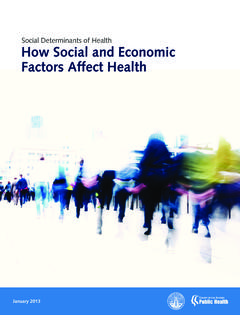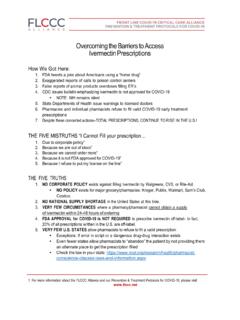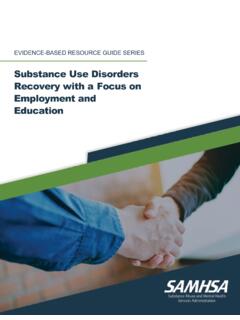Transcription of Mental Health - Age UK
1 Policy Position Paper Mental Health (England) July 2019 Older people must have fair and equal access to the services, support and opportunity to maintain good Mental wellbeing. Older people must have confidence that their Mental Health needs are fully recognised and supported and seen as equally important as their physical Health needs. Over recent years there has been growing recognition that looking after our Mental Health is just as important as physical Health for maintaining good quality of life, whatever our age. Yet older people often face barriers to accessing services to support their Mental Health , as well as barriers to taking part in activities which give their life meaning. Mental Health conditions in older people are not an inevitable part of ageing. There are positive things people can do at any age to look after their Mental Health and if an older person does develop a Mental Health condition, recovery is possible with the right support.
2 However, as it stands, older people have worse access to talking therapies compared to other age groups and can find that specialist support, for example from psychiatrists specialising in older Key statistics 1 in 4 older people live with common Mental Health conditions. 7% Proportion of people referred to NHS counselling who are 65+ (it should be 12%) 15% Proportion of older people with Mental Health conditions receiving help from the NHS. I never called it as depression I just felt awful, you know, you feel sad, I think sad is the word that I ve used Healthcare England July 2019 ---------------------------------------- ------------------------------- 2 Policy Position Paper people s Mental Health , is not available in their area. With Mental Health being increasingly, and rightly, seen as a priority for improvement and investment, it is essential that older people s Mental Health needs are not left behind. What do we mean by Mental Health ? Everybody has a state of Mental Health : it is the way we think, feel, and cope with life s ups and downs.
3 We all experience times of positive Mental Health , as well as times where our wellbeing is lower and we may need some help. For some people this may mean feeling down or worried from time to time, but others may have a diagnosable Mental Health condition and can benefit from professional support. Looking after our Mental Health is just as important as staying physically fit. Older people s experiences of Mental Health problems are too often viewed exclusively through the lens of dementia, but Mental Health problems, such as depression and anxiety, are common among all age groups. This paper will cover a broad range of issues related to Mental wellbeing but for specific information on dementia read our dementia policy positioni. What is the current level of need? Older people are as likely to experience Mental Health difficulties as anyone else, yet their needs are often overlooked. The most common Mental Health condition in older people is depression, affecting 22% of men and 28% of women aged 65 or over, followed by anxietyii.
4 Prevalence of Mental Health conditions is higher among specific groups of older people. 40% of older people who are living in care homes have depression; 30% of older carers experience depression at some pointiii; and older people going through a bereavement are up to four times more likely to experience depression than older people who haven t been bereavediv. Are there differences in older people s Mental Health needs? Older people s experiences of Mental Health can differ from those of working age adults. This includes in the way Mental Health conditions develop and the symptoms which they experience. Older people are more likely to experience physical Health conditions which can trigger or exacerbate Mental Health issues. Multi-morbidity (living with multiple long-term conditions) is common among older people, with 80% of people over 65 having been diagnosed with more than one long-term Health condition and the majority of people aged 80 and over living with three or morev.
5 This presents challenges for older people including chronic pain, impaired functioning, reduced independence and social isolation, all of which place a strain on Mental Health . The crossover between Mental and physical conditions can also lead to misdiagnosis, with professionals diagnosing physical symptoms as Mental Health problems or vice versa. The close relationship between physical and Mental Health means that treatment for older people needs to be integrated, rather than condition specific. Healthcare England July 2019 ---------------------------------------- ------------------------------- 3 Policy Position Paper Dementia is another factor which can influence older people s Mental Health . Not only can dementia trigger Mental Health problems, with estimates suggesting that 20-40% of people living with dementia are depressedvi, but it can also make treatment of Mental Health conditions more challenging. Symptoms of dementia can be similar to those of other Mental Health conditions, such as depression and anxiety, making accurate diagnoses harder.
6 Older people living with dementia may struggle to express how they are feeling which also increases the difficulty of diagnosisvii. Loneliness is not specific to any age group, but there are pressure points for older people which can increase the likelihood of loneliness, and subsequently Mental Health conditions, including the death of a loved one or the onset of disability and illnessviii. Without action to tackle loneliness, there are projected to be over 2 million people aged 50 and over experiencing loneliness in the next decadeix. Being lonely increases the risk of Mental Health conditions, including dementia and depression. It is important that older people are able to access services which are appropriate for their needs. Some older people may prefer to attend adult services, but for others it can be more beneficial to access specialist services for older people, led by experts in social and psychological issues related to ageingx. Currently many older adults are not offered these bespoke services due to insufficient commissioning of services targeted at older people and a shortage of experts in older people s Mental Health .
7 barriers to older people seeking Mental Health support Many older people do not seek support when they are struggling with their Mental Health . Only one-third of older people say they would visit their GP if they felt depressedxi and less than half of older people experiencing bereavement say they would be interested in counsellingxii. There are many reasons for this, including perceiving poor Mental Health as an inevitable part of ageing, fear of being a burden, and concern about being judged or stigmatisedxiii. Stigma around Mental Health may mean some older people will not accept their diagnosis, even after seeing a Health professional. Healthcare England July 2019 ---------------------------------------- ------------------------------- 4 Policy Position Paper There is also less awareness among older people about Mental Health , meaning that they do not always recognise they are experiencing a Mental Health condition. For example, while they may recognise that they are feeling consistently sad, they may not realise this could be a symptom of depression.
8 We must support older people to recognise the symptoms of Mental Health conditions and to feel able to reach out for help when needed. Evidence of discrimination in access to support Older people do not receive fair and equal access to the Mental Health services which they need. While younger people are directed to talking therapies, it is more common for older people to be prescribed medication by their GPs. Older people are a fifth as likely as younger age groups to have access to talking therapies, but six times more likely to be on tranquillisersxiv. The proportion of users to the Improving access to Psychological Therapies (IAPT) service who are over 65 has remained stagnant at 7% despite this age group making up 18% of the population. A previous Government target, set in 2011, to increase the proportion of older people referred to 12% has never come close to being achievedxv. Ingrained beliefs about older people fuels discrimination in Mental Health services.
9 Evidence shows many Health professionals: Are reluctant to talk about Mental Health with older people, especially older males, as they presume it will make older people feel uncomfortablexvi Perceive Mental Health conditions as an inevitable part of ageing so do not refer people to support. This is particularly true regarding bereavementxvii. Believe that talking therapies are not effective for older people or that older people will not engage with the process, so opt to prescribe medications insteadxviii. Evidence shows that these presumptions are unfounded and in reality older people are more likely to engage with and benefit from Mental Health treatment when it is offered to them than their working age counterpartsxix. Older people also face barriers from the design of Mental Health services, with variation in accessibility across the country. IAPT, for example, was originally established as a service for working age people so has not been shaped by the needs of older people.
10 This means some staff are less confident in supporting older users and the time and locations of services can be Improving access to Psychological Therapies (IAPT) Programme IAPT is an NHS programme in England which offers evidence-based talking therapies to people with anxiety disorders and depression. IAPT is available to adults of any age and is delivered by trained and accredited practitioners. Healthcare England July 2019 ---------------------------------------- ------------------------------- 5 Policy Position Paper inaccessible. The application process to IAPT involves self-referral and online elements which is a further obstacle to entering the systemxx. Some groups of older people are at even greater risk of missing out on Mental Health support. Black, Asian and minority ethnic older people can face additional obstacles, including language barriers , lack of access to information or a lack of culturally sensitive servicesxxi. The likelihood of accessing support also decreases the older the person becomes and people over 90 are severely underrepresented in Mental Health servicesxxii.
















